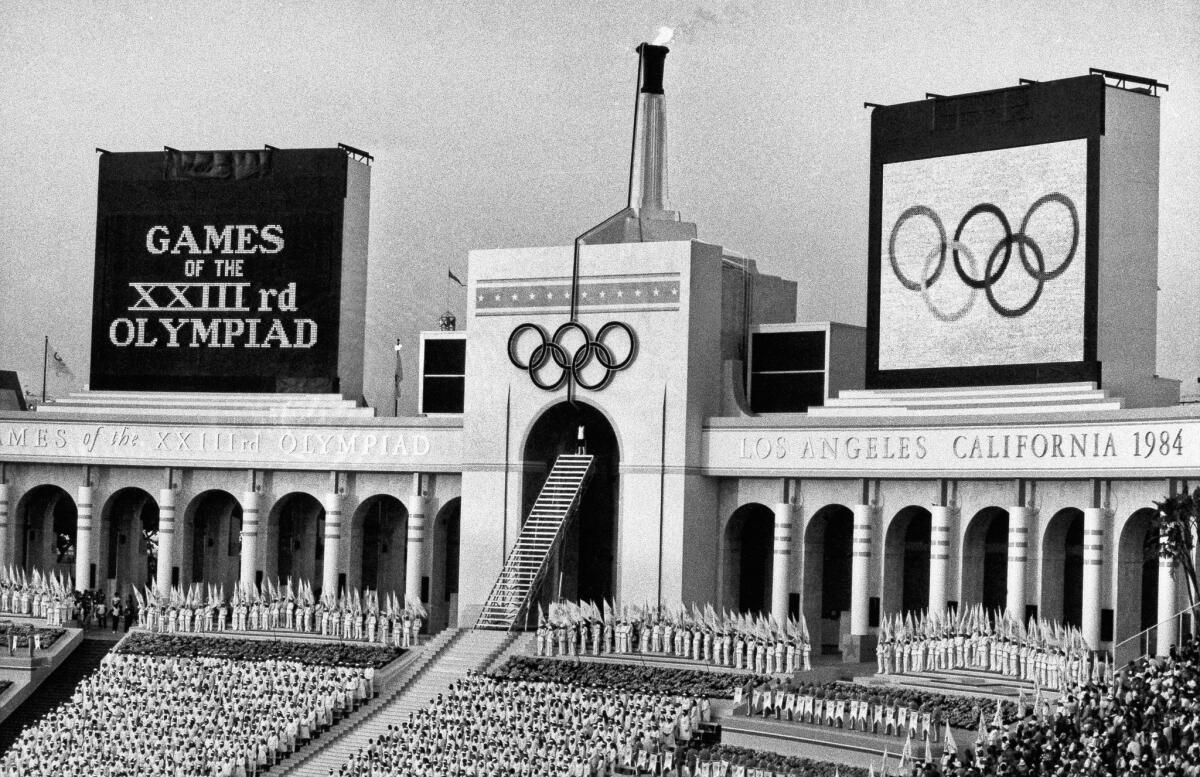Op-Ed: Would L.A. be better off without the Olympics?

Rafer Johnson lights the Olympic flame at the L.A. Memorial Coliseum during the opening ceremonies of the XXIII Olympiad on July 28, 1984.
As epic collapses go, Boston’s bid to host the 2024 Olympics wins points for speed, if nothing else. On Monday, Mayor Marty Walsh announced that he didn’t intend to sign the International Olympic Committee’s required pledge to cover any cost overruns on the Summer Games. Within hours, the U.S. Olympic Committee, which had anointed Walsh’s city as its chosen candidate just six months earlier, was saying, “Boston who?”
All eyes now turn to the runners-up — primarily Los Angeles, but San Francisco and Washington as well — to see if a new U.S. candidate can be salvaged from the wreckage before the Sept. 15 bid deadline. But should the rejects even want another grab at the brass ring? Or is hosting the Olympics such an expensive proposition that cities are better off without them?
Although Boston’s sudden exit may have come as a surprise, the writing has been on the wall for a while. Polls showed that more Bostonians opposed hosting the games than backed them, and Massachusetts Gov. Charlie Baker had already hired two prominent Olympic-skeptic economists to investigate the bid committee’s ever-changing budget claims.
Besides, backing out of Olympic bids has become fashionable of late: Oslo, Krakow, Stockholm and Munich all bailed on the 2022 Winter Games after being declared finalists; and New York and Philadelphia were among the U.S. cities to decline invitations to pursue the 2024 Summer Games on the grounds that it was, in the words of Philly mayor Michael Nutter, a “tremendous, costly endeavor.”
“Costly” is an understatement. A recent Oxford University study of 17 Olympics from 1960 through 2012 found that every single one had busted its budget, on average nearly tripling initial estimated costs. That’s a big reason why, despite the flood of ticket money and corporate sponsorships washing around the games, cities are often left with seas of red ink.
Factoring in costs for infrastructure and security, Athens and London both lost billions on the 2004 and 2012 Summer Olympics. London organizers tried to argue that the city had made up for its losses with revenue from increased tourism. That claim fell flat when it turned out that visits from foreigners actually went down 5% during the Olympics compared with the previous August.
Some claim L.A. would fare better since it’s already home to several recently constructed venues, including Carson’s StubHub Center and its adjacent velodrome for cycling, rugby and field hockey, the Staples Center for basketball and gymnastics, and sites at USC and UCLA.
Still, the city would face significant costs for upgrading those facilities. Keep in mind that by 2024 Staples Center will have turned 25, an eon in arena years, and that readying the L.A. Coliseum for the opening and closing ceremonies would
require a massive renovation.
And as was the case with Boston, the local bid committee still hasn’t released a comprehensive finance plan or estimated the cost for transit and security. The truth is there’s no way to know for sure how much taxpayers would eventually have to
contribute.
Perhaps Los Angeles should join Boston, Oslo and the rest in saying no — if not to an Olympic bid entirely, then at least to the IOC’s more extravagant requirements, like that cost-overrun guarantee that Mayor Walsh refused to sign. Los Angeles could pitch a more frugal approach to the Summer Olympics, and insist it wouldn’t spend money on preparations that it could never realistically recoup.
In the short term, this would likely mean the 2024 games would go elsewhere. Paris, Rome and Hamburg are all still in the running, though there’s significant citizen opposition in those cities as well.
In the longer term, a hard line from U.S. cities could make things interesting for 2028 and beyond as the IOC would have to choose between its demand for a blank check, and access to the massive American market.
After all, the last time L.A. got the Olympics in 1984, it was because other major world cities, fearful of a repeat of the 1976 Montreal games that turned into a massive budget drain, all backed out.
Ultimately, L.A. was left as the only remaining bidder — and was approved despite a plan that relied entirely on existing venues, including the then-51-year-old Coliseum, and omitted any city guarantee to cover losses. The result was an Olympics that is still lauded today for running a good show on a reasonable budget.
Maybe the lesson here is that the Olympics can succeed only when cities stand up to the IOC. It’s not a sure thing — the IOC may never change its ways so long as there are governments like those in Russia and China willing to spend without limit. But then, the Olympics are supposed to be about chasing your dreams, aren’t they?
Neil deMause is co-author of the book “Field of Schemes” and runs the stadium and arena news site of the same name.
Follow the Opinion section on Twitter @latimesopinion and Facebook
More to Read
A cure for the common opinion
Get thought-provoking perspectives with our weekly newsletter.
You may occasionally receive promotional content from the Los Angeles Times.










